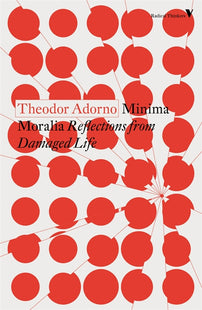Theodor Adorno on our relationship to our parents
Unpolitical attempts to break out of the bourgeois family usually lead only to deeper entanglement in it, and it sometimes seems as if the fatal germ-cell of society, the family, were at the same time the nurturing germ-cell of uncompromising pursuit of another.

As part of our September student reading, we're publishing an excerpt from Theodor Adorno's beloved collection Minima Moralia: Reflections from Damaged Life every day until the end of the month.
All books are 40% off as part of our Student Reading Sale. Ends September 30 at 11:59PM EST. See all our student reading lists here.
Grassy seat
Our relationship to parents is beginning to undergo a sad, shadowy transformation. Through their economic impotence they have lost their awesomeness. Once we rebelled against their insistence on the reality principle, the sobriety forever prone to become wrath against those less ready to renounce. But today we are faced with a generation purporting to be young yet in all its reactions insufferably more grown-up than its parents ever were; which, having renounced before any conflict, draws from this its grimly authoritarian, unshakeable power.
Perhaps people have at all times felt the parental generation to become harmless, powerless, with the waning of its physical strength, while their own generation already seemed threatened by the young: in an antagonistic society the relation between generations too is one of competition, behind which stands naked power. But today it is beginning to regress to a state versed, not in the Oedipus complex, but in parricide.
One of the Nazis' symbolic outrages is the killing of the very old. Such a climate fosters a late, lucid understanding with our parents, as between the condemned, marred only by the fear that we, powerless ourselves, might now be unable to care for them as well as they cared for us when they possessed something. The violence done to them makes us forget the violence they did. Even their rationalizations, the once-hated lies with which they sought to justify their particular interest as a general one, reveal in them an inkling of the truth, an urge to resolve a conflict whose existence their children, proof against all uncertainty, cheerfully deny. Even the outdated, inconsistent, self-doubting ideas of the older generation are more open to dialogue than the slick stupidity of Junior. Even the neurotic oddities and deformities of our elders stand for character, for something humanly achieved, in comparison to pathic health, infantilism raised to the norm. One realizes with horror that earlier, opposing one's parents because they represented the world, one was often secretly the mouthpiece, against a bad world, of one even worse.
Unpolitical attempts to break out of the bourgeois family usually lead only to deeper entanglement in it, and it sometimes seems as if the fatal germ-cell of society, the family, were at the same time the nurturing germ-cell of uncompromising pursuit of another. With the family there passes away, while the system lasts, not only the most effective agency of the bourgeoisie, but also the resistance which, though repressing the individual, also strengthened, perhaps even produced him. The end of the family paralyses the forces of opposition. The rising collectivist order is a mockery of a classless one: together with the bourgeois it liquidates the Utopia that once drew sustenance from motherly love.
I. Allusion to the lines of a well-known German song: Der liehste Platz den ich auf Erden hab',/ das ist die Rasenhank am Elterngrab (The dearest spot I have on earth / is the grassy seat by my parents' grave).
